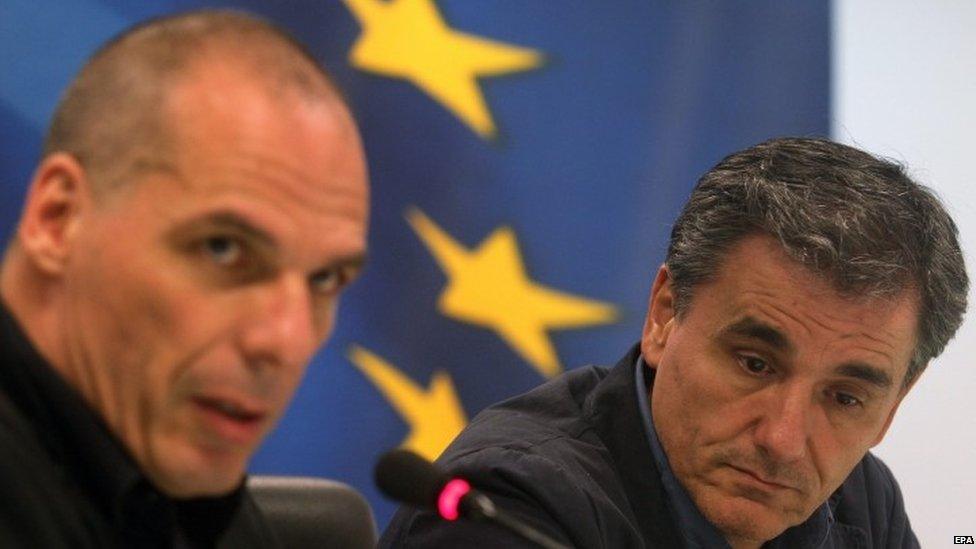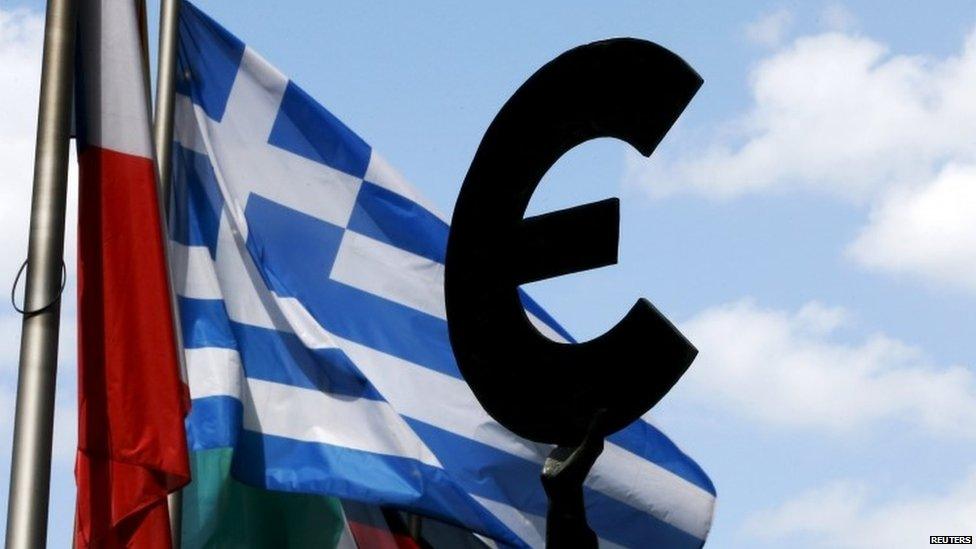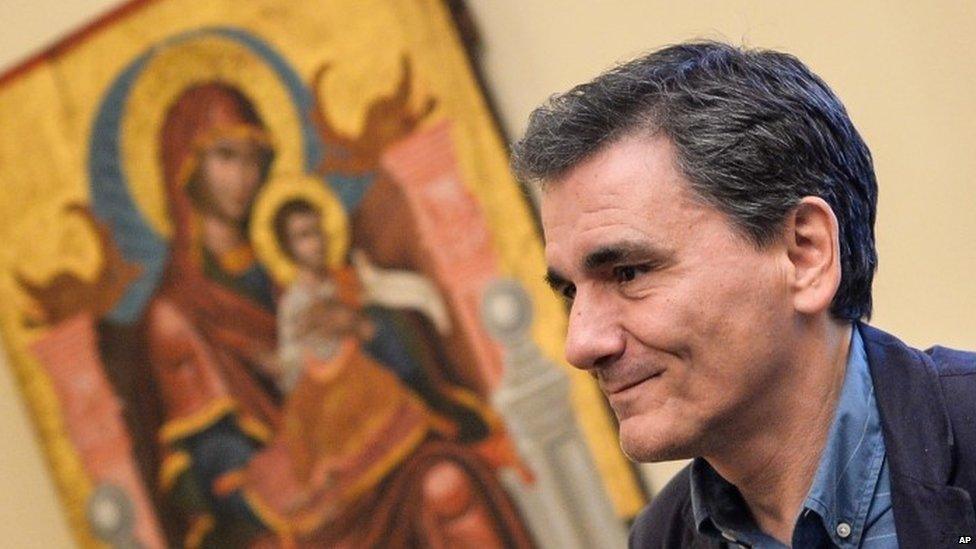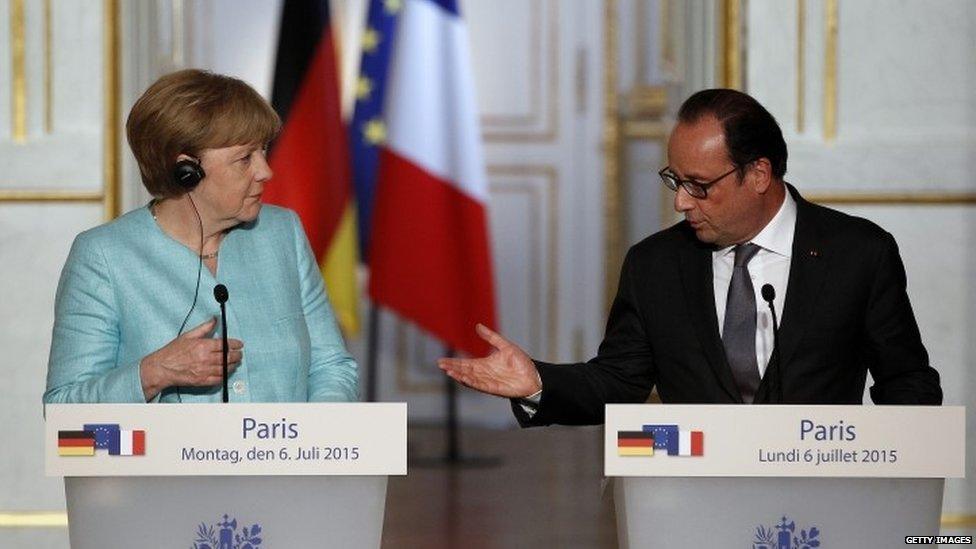Euclid Tsakalotos: Greece's new finance minister
- Published

Mr Tsakalotos (right) is expected to take a less bombastic approach to debt negotiations than his predecessor Yanis Varoufakis (left)
New Greek Finance Minister Euclid Tsakalotos may be less flamboyant than his predecessor Yanis Varoufakis, but his views on his country's debt crisis are no less stridently held.
While most commentators appear to agree that Mr Tsakalotos, 55, will be less bombastic than Mr Varoufakis in his dealings with international creditors, some argue that his negotiating stance could even be more hardline.
Mr Tsakalotos is a Dutch-born, Oxford University-educated economics professor who served as minister for international economic affairs before taking over from Mr Varoufakis as Greece's lead negotiator in its debt talks in April.
A long-serving member of the governing Syriza party - in contrast to Mr Varoufakis - he was the obvious choice to become the new finance minister. His less confrontational style is certain to be welcomed by creditors - although few expect him to be a pushover.
'Europe of equals'
In a rare interview with the French newspaper Liberation last month, Mr Varoufakis argued that Greece's creditors "did not appear prepared to compromise" and seemed determined to impose "unrealistic" demands.

The new finance minister says that he is determined to keep Greece in the euro and for it to remain part of Europe

Mr Tsakalotos - an Oxford University educated academic - faces daunting challenges in the days and weeks ahead
"Our interlocutors each time insist on pension cuts. It's unrealistic [to ask for that] in a country where pensions have been considerably reduced over the past five years, and where two in three pensioners live under the poverty line," he said.
Showing the same fondness as Mr Tsakalotos for rhetorical flourishes, he argued in March that Greece was "not asking for special treatment, but for equal treatment in a Europe of equals".
Mr Tsakalotos insisted that the Syriza government was "fundamentally pro-Europe" and that it wanted "a viable economic programme inside the euro".
A mild-mannered married father-of-three, the new finance minister has spent much of his professional life working as an academic outside Greece, a fact that sometimes comes across in an English tilt to his accent. He returned to his country to work at Athens University in the early 1990s.
Massive debt
It was during his time at Oxford University that he joined the student wing of Greece's eurocommunist party, motivated by what he saw as the unjust treatment of the Greek left - who spearheaded the resistance against Nazi occupation - in the civil war that followed World War Two.

It is expected that Europe's leaders will find Mr Tsakalotos easier to work with than his predecessor
Mr Tsakalotos will face a stern challenge in his new role at the finance ministry.
Correspondents say that his immediate priority will be to get the the European Central Bank to provide an emergency injection of euros before Greece's banks run out of cash - something that it is feared could happen imminently despite more than a week of capital controls.
He will then have to persuade eurozone leaders to give Greece another chance at negotiating a bailout in addition to convincing creditors to discuss a restructuring of his country's massive debt.
If that fails, Mr Tsakalotos will face the agony of negotiating a divorce that he has always maintained that he does not want to happen - a Greek exit from the euro.

Euclid Tsakalotos
Born in 1960 in Rotterdam, married to British economist Heather Gibson
Studied economics, politics and philosophy at the universities of Oxford and Sussex, and completed his PhD in economics at Oxford University
A professor at the university of Athens since 2012, Mr Tsakalotosis is the author of six books and numerous newspaper and magazine articles
He describes his main interests as macroeconomics, politics and the philosophy of economic science
Sees a "crisis of democracy" affecting Europe as a whole
